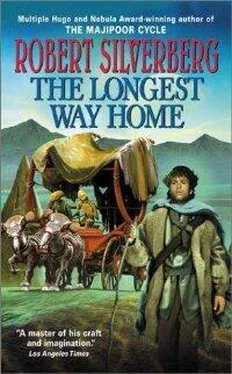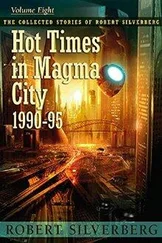As he lay there he tried to conjure up a meal for himself out of nothing more than his imagination, a plate of sweet river-crabs followed by roast haunch of heggan in mint sauce, with baked compolls on the side, and a steaming brisbil pudding afterward. He had almost managed to delude himself into believing that he had really done it, that he had just enjoyed a rich, tasty dinner and was feeling much the better for it, when he regained enough clarity of mind to realize that it had been nothing more than a pleasant fantasy, that his stomach was still empty, that in fact he was on the verge of dying of starvation. He knew he was dying and almost did not care.
He lay back and closed his eyes. It seemed to him then that he heard the sounds of rumbling wheels nearby, of swiftly moving vehicles, as though there might be a highway just beyond the hedge across the way. But that had to be a delusion too. He had walked through this beautiful countryside for days, weeks, maybe even months, without ever finding any trace of civilized life other than the hunters’ camp that he had come upon on his very first day down from the mountains. The nearest settlement of any kind was probably still a hundred miles away. He would not live to see it.
He realized then that he did care, at least a little, that his life was reaching its end.
How embarrassing it is, Joseph thought, to be dying like this, not even sixteen years old, the heir to House Keilloran transformed into a ragged bundle of skin and bones lying under a bush in some unknown corner of Middle Manza. He had always been so competent, so very good at looking after himself. What were they going to think back in Keilloran when the news finally reached them of what had happened to him? Martin would not weep, no. One quick wince, perhaps: that would be all the outward sign of emotion he would permit himself to show. His father had not even wept when his own beloved wife had died, so suddenly and senselessly, of the bite of that harmless-looking little red toad that had fallen from a tree and landed on her arm. Probably he had never wept in his life. But Joseph knew what her death had done to his father inside, and he knew what his own death would do to him, too.
And his brother Eitan, who was six years younger than Joseph was and had always worshipped him—Eitan would simply not be able to believe that his wondrous brother Joseph had perished in this idiotic way. Eitan would deny the news; he would be angered by it, he would pound the messenger furiously with his fists, he would turn to his father and say in that solemn old-man manner of his, “This is not true, Joseph would never have allowed such a thing to befall him.”
And Rickard, three years older than Eitan—he would be angry too, but not for the same reason. Rickard, who now would have to become the heir to House Keilloran: how he would boil with rage at the realization that those responsibilities were unexpectedly going to be dumped upon him! Rickard was not the sort to run a Great House: everyone knew that, Rickard best of all. He was a clever boy, too clever for his own good, so bright that his intelligence worked against him. Rickard could always find ways to avoid handling anything difficult. Either he would sidestep any real challenge or he would simply allow it to flow around him like water around a boulder in a riverbed, whichever was easier. But it had never been necessary for him to be otherwise. He was only the second son. Joseph was the heir; Rickard knew he could look forward to a life of ease.
Perhaps Rickard would change, now that there was no Joseph and he was going to be the first in line to inherit. Now that he could see the duties that went with being the Master of House Keilloran heading toward him like an avalanche. Joseph hoped so. Perhaps Cailin would help him. She was fourteen, old enough to understand these things, old enough to show Rickard that it would no longer suffice for him to slide by on mere cleverness, that he must take the trouble now to put that cleverness of his to responsible uses, inasmuch as his older brother was dead and he would someday be the Master of the House in his own right. She was a wise girl, Cailin, much undervalued by everyone, as girls tended to be. He wished now that he had treated her better.
Of course Joseph thought of his father, too, that stern, serious, studious man whom Joseph had never come to know as closely as he would have liked to. He never would, now. One thought led to another and he saw other and more ghostly members of his family standing before him, his mother the Mistress Wireille, who had betrayed them all by dying so young, and then his father’s father, old Master Eirik, who had always seemed so forbidding of mien with his great white beard and jutting nose and tight-clamped scowling lips, but who actually had been the warmest and most kindhearted of men, the ruler of the House for sixty years and beloved by all. Joseph remembered how fond his grandfather had been of telling tales of the Keilloran Masters of times gone by, the whole long line, an earlier Joseph and an earlier Martin and an earlier Eirik, far back into the first days of the Masters of Homeworld, the same names over and over, bold visionary men who had carved out the family domain in the bounteous subtropical Southland and ruled it with wisdom and foresight and justice. Joseph, only a small boy then, had felt an enormous sense of pride at hearing those stories, at knowing that he was descended from that long line of Keillorans, that one day he would sit where they had sat, and would discharge the awesome duties of his post in a way that showed that he was worthy of his inheritance, and would in his turn continue the line by engendering the Masters who would follow him—
“Easy with him,” someone was saying. “Will break in pieces if you handle him too rough, that one.”
“No meat on’s bones, none. None. Half dead, he is.”
“Half and more. Easy, now. Up with him. Up.”
His mind was still full of thoughts of his grandfather, and of his grandfather’s grandfathers back through time. It seemed to him that one of the voices he was hearing, a deep, gruff one, was his grandfather’s voice, the voice of Eirik Master Keilloran, who had made a special journey to Middle Manza to rescue his errant grandson. Could that be? His grandfather was dead these ten years past, was he not? Perhaps not. Perhaps that was he, right here, now, his father’s father, that wonderful fierce-looking old man. Who would scoop him up, take him in his arms, stride easily from province to province with him until he was home again in Keilloran.
“Grandfather?” Joseph said. He did not open his eyes. “Is that really you, grandfather?”
There was no answer. He was not at all sure that he had actually spoken aloud.
But it definitely was true that he was being lifted, carefully, very carefully, cradled like a dangling cloak across someone’s outstretched arms. The stirring of fresh air around Joseph’s head brought him back a little way into conscious awareness, and he opened his eyes a bit, peering out through slitted lids. There were two men, neither of them his grandfather, though one, the one with the deep, gruff voice, was indeed old and bearded. But his beard was an untidy straggling thing and he was a short, heavy-set man wearing a tight yellow jerkin and loose-fitting trousers that flared at the cuffs, Folkish clothes, and his face, framed by his long unkempt grayish hair, was a pure Folkish face, coarse-featured, heavy-jawed, bulbous-nosed. The other man, the one who was carrying him, looked much younger, and Folkish also. And Folkish was what they were speaking, though it was a strangely slurred Folkish, very nasal, not at all familiar.
Joseph realized that he himself, when he had cried out a moment ago to his grandfather, would surely have spoken in Master. So if he really had spoken aloud they must know what he was, and thus all of his months of strenuous travail had been in vain. He had been captured by the rebels anyway, and now, he assumed, they were going to put him to death.
Читать дальше












